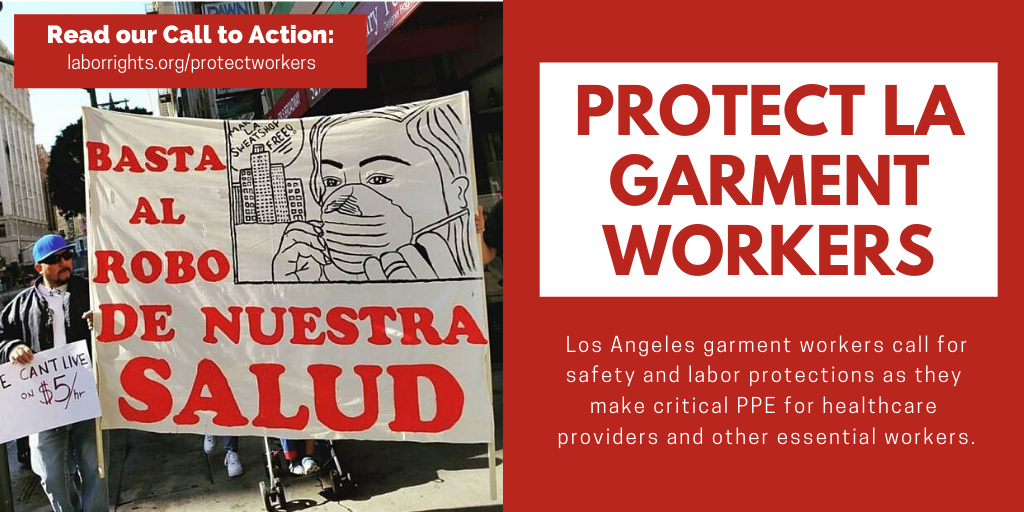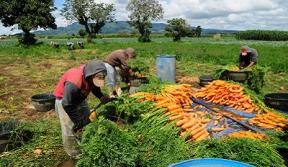In a joint letter together with 28 other organizations, the International Labor Rights Forum and the Garment Worker Center in Los Angeles, the center for garment producton in the U.S., shared recommendations on worker health protection and workers’ rights measures for brands/manufacturers producing or sourcing apparel, textiles, and/or PPE from factories in the United States. The letter was shared with dozens of garment manufacturers and fashion brands that produce in the United States, including ones that have shifted some production to face masks and other PPE, and to multiple government officials.
"Given widespread exploitation in the garment industry and as manufacturers and government offices are ramping up PPE production under the immense pressure of the pandemic, it's important to us that the workers providing this critically needed labor have their labor rights respected and health protected," states Marissa Nuncio, Director of the Garment Worker Center.
The recommendations include the CDC’s Interim Guidance for Businesses and Employers to Plan and Respond to Coronavirus Disease 2019, that highlight hand hygiene and cough and sneeze etiquette, and additional standards such as:
- paid breaks for hand-washing
- paid training on all Covid-related safeguards
- paid sick leave for the duration of Covid-19 related illness, and at least 14 days of paid leave going forward
- unemployment benefits or other forms of income replacement that include workers irrespective of immigration or independent contractor status, or their employer's failure to register them as employees.
“For years, tens of thousands of workers across Los Angeles’ garment industry – the majority of whom are women – have experienced wage theft when they aren’t even paid the legal minimum wage,” said Judy Gearhart, Executive Director of the International Labor Rights Forum. “Many of these women are now being called on to make face masks while others risk losing their jobs as garments factories close temporarily. It’s critical for workers’ lives and livelihoods that brands uphold their responsibility to workers in their supply chains.”
Highlighting the personal impact of lack of protection at work, Pablo Hernandez, Garment Worker Center Member explains, "This is frustrating. This is a crisis. My boss called me [recently] and asked if I wanted to work making masks for hospitals. I said yes . . . They are paying us for what we make [by the piece]. I worked all day, probably 10 hours. I'm lucky if I made 50 dollars today."
The letter also calls on companies that are reducing orders from factories, or that have been required to close operations during the pandemic, to pay in full on orders for which material has been purchased or production has already begun; to ensure unemployment benefits reach all their workers affected by job loss; and to ensure that when factories reopen that first-hire priority is given to laid-off workers to their previous posts and deadlines for orders are reassessed to prevent workers from working mandatory overtime.
Endorsers of the letter: Garment Worker Center, International Labor Rights Forum, Act Now to Stop War End Racism (ANSWER) Coalition, Bet Tzedek, California Labor Federation, Clergy and Laity United for Economic Justice (CLUE), Coalition for Humane Immigrant Rights of Los Angeles (CHIRLA), Global Economy Project at the Institute for Policy Studies, Global Labor Justice, Green America, Korean Immigrant Workers Alliance (KIWA), Los Angeles Alliance for a New Economy (LAANE), Los Angeles County Federation of Labor, AFL-CIO, Los Angeles Worker Center Network, Living Wage for All Campaign at the United Methodist Women, National Council for Occupational Safety and Health, National Day Laborer Organizing Network, National Union of Healthcare Workers, National Women’s Law Center, New England Joint Board UNITE HERE, Partners for Dignity & Rights, Party For Socialism and Liberation, SEIU United Healthcare Workers West, Southern California Coalition for Occupational Safety & Health, T’ruah: The Rabbinic Call for Human Rights, UCLA Labor Center, United Students Against Sweatshops, and Workers United.

